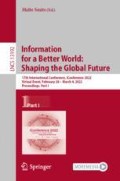Abstract
Collective memory of scientists shapes the foundation of the discipline. References in the scientific literature delineate the boundaries of the disciplines and also documented their history. However, due to the two mechanisms of preferential attachment and temporal decay, many articles that were frequently cited in the past are no longer cited. So, is the collective memory of library and information science partly gone? Which classic documents have been forgotten, and what caused the forgottenness? In this study, we analyzed the references of major publications in the Library and Information Science (LIS) field, and found that many famous works have been forgotten in the past few decades. Through calculating the differences in citations over decades, we find the top 2% forgotten publication list, and summarize the main reasons for the forgotten scientific literature, which are obliteration by incorporation, loss of fashion, short timeliness and replaced by new knowledge. Our findings provide a preliminary understanding of the establishment process of the collective memory.
Access this chapter
Tax calculation will be finalised at checkout
Purchases are for personal use only
Notes
- 1.
Dougherty, R. M., & Heinritz, F. J. (1969). Scientific management of library operations (No. Z678 D6).
- 2.
Downs, R. B. (1957). The current status of university library staffs. College & Research Libraries, 18(5), 375–385.
- 3.
Salton, G., & McGill, M. J. (1983). Introduction to modern information retrieval. mcgraw-hill.
- 4.
Garfield, E., & Merton, R. K. (1979). Citation indexing: Its theory and application in science, technology, and humanities(Vol. 8). New York: Wiley.
- 5.
Kuhn, T. (1966). The structure of scientific revolutions (pp. 176–177). Princeton University Press.
- 6.
Rogers, E. M. (1967). Diffusion of innovations. Simon and Schuster.
References
Li, X., Yao, Q., Tang, X., Li, Q., Wu, M.: How to investigate the historical roots and evolution of research fields in China? a case study on imetrics using rootcite. Scientometrics 125(2), 1253–1274 (2020). https://doi.org/10.1007/s11192-020-03659-3
Hirst, W., Manier, D.: Towards a psychology of collective memory. Memory 16(3), 183–200 (2008)
Candia, C., Jara-Figueroa, C., Rodriguez-Sickert, C., Barabási, A.-L., Hidalgo, C.A.: The universal decay of collective memory and attention. Nat. Hum. Behav. 3(1), 82–91 (2019)
Merton, R.K.: On the Shoulders of Giants: The Post-Italianate Edition. University of Chicago Press (1993)
McCain, K.W.: Mining full-text journal articles to assess obliteration by incorporation: Herbert A. S imon’s concepts of bounded rationality and satisficing in economics, management, and psychology. J. Assoc. Inf. Sci. Technol. 66(11), 2187–201 (2015)
McGail, A.: Lost & forgotten: an index of the famous works which sociology has left behind. Am. Sociol. 52(2), 304–340 (2021)
Braslavski, P., et al. (eds.): RuSSIR 2015. CCIS, vol. 573. Springer, Cham (2016). https://doi.org/10.1007/978-3-319-41718-9
Kerlinger, F.N.: Foundations of Behavioral Research. Holt, Rinehart and Winst (1973)
Haitun, S.: Stationary scientometric distributions: part I. Differ. Approximations Scientometrics 4(1), 5–25 (1982)
Dickson, G.W., Leitheiser, R.L., Wetherbe, J.C., Nechis, M.: Key information systems issues for the 1980’s. MIS Q. 135–59 (1984)
Rockart, J.F., Flannery, L.S.: The management of end user computing. Commun. ACM 26(10), 776–784 (1983)
Barricelli, B.R., Cassano, F., Fogli, D., Piccinno, A.: End-user development, end-user programming and end-user software engineering: a systematic mapping study. J. Syst. Softw. 149, 101–137 (2019)
Author information
Authors and Affiliations
Editor information
Editors and Affiliations
Rights and permissions
Copyright information
© 2022 The Author(s), under exclusive license to Springer Nature Switzerland AG
About this paper
Cite this paper
Zhai, Y., McGail, A., Ding, Y. (2022). Elapsed Collective Memory: Looking for the Forgotten Classic Works in Library and Information Science. In: Smits, M. (eds) Information for a Better World: Shaping the Global Future. iConference 2022. Lecture Notes in Computer Science(), vol 13192. Springer, Cham. https://doi.org/10.1007/978-3-030-96957-8_7
Download citation
DOI: https://doi.org/10.1007/978-3-030-96957-8_7
Published:
Publisher Name: Springer, Cham
Print ISBN: 978-3-030-96956-1
Online ISBN: 978-3-030-96957-8
eBook Packages: Computer ScienceComputer Science (R0)

